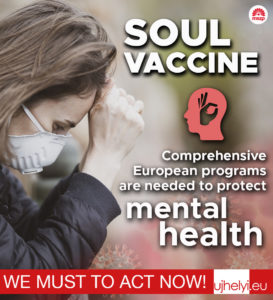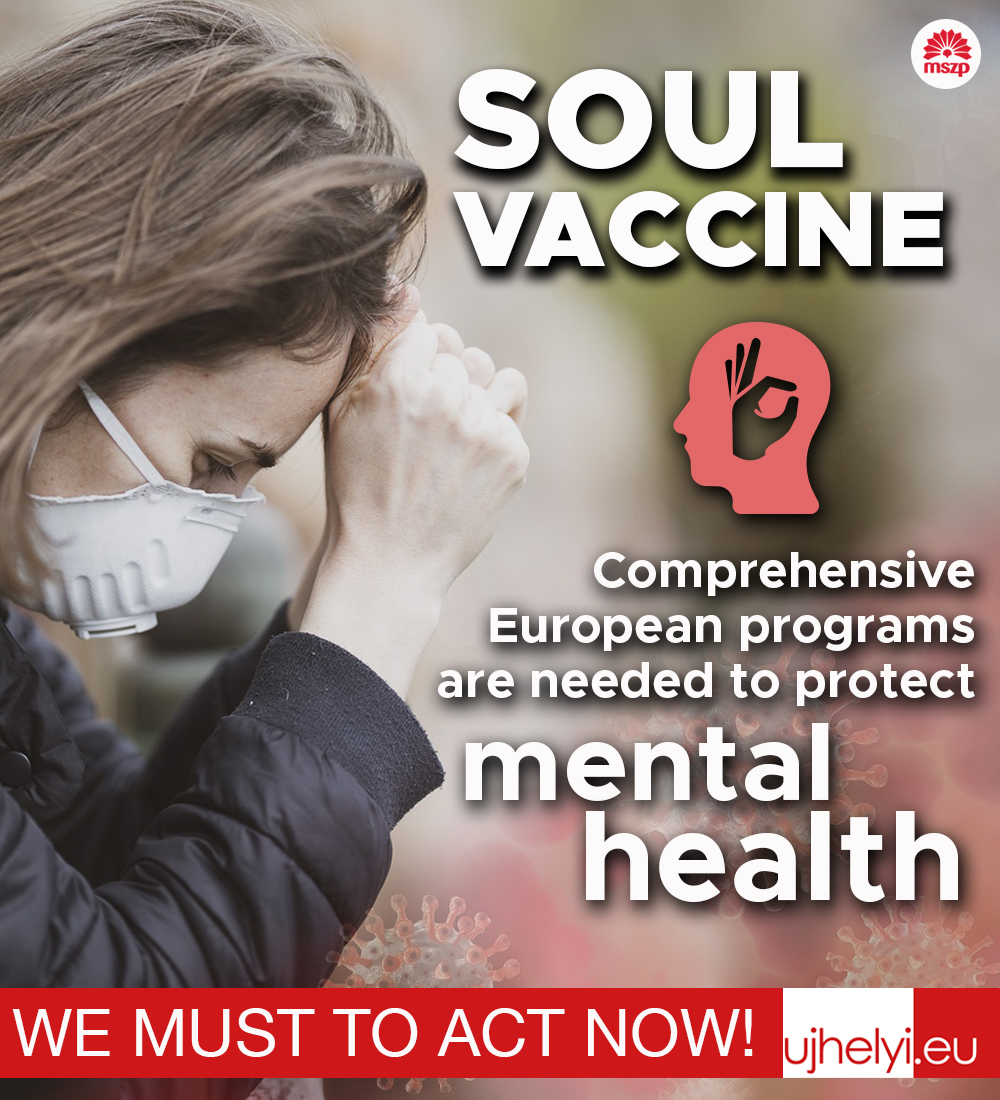Published: 25.5.2021
 SOUL VACCINE – Mental Action Plan for Post-Covid Phenomena
SOUL VACCINE – Mental Action Plan for Post-Covid Phenomena
The protracted pandemic has posed a serious mental health challenge to almost all of humanity, including us Europeans.
The mental and psychological effects of the covid virus affect not only the members of the infected population, but also those who, although they have been spared the virus, have suffered significant mental impacts due to restrictions, reduced social contacts, negative economic consequences and forced changes in lifestyle. In other words, almost all people.
According to a Boston analysis (synthesising related research from several countries) published in the peer-reviewed journal Nature Medical, one in three people who have been infected with the virus suffer from some form of post-covid illness: anxiety, depression, post-traumatic stress disorder or other neurological complications.
Research is ongoing (e.g., at the Department of Developmental Psychology at ELTE-Faculty of Education and Psychology and through an initiative of UNICEF Hungary) on the extent of mental distress among those who have not contracted the virus but have been psychologically damaged by restrictions, quarantine, disruption of social relationships, livelihood insecurity or extreme stress.
We can already safely say that a significant proportion of society has been mentally affected and is still suffering from the coronavirus epidemic and its aftermath. In February this year, the European Commission, in collaboration with five children’s rights organizations, published a survey showing that one in five children are distressed and unhappy because of the virus and one in ten have been found to have specific symptoms of mental health problems (e.g. depression). UNICEF’s Hungarian Young Ambassadors, as well as SOS Children’s Villages’ own research, confirmed that anxiety and feelings of emptiness among young people had increased significantly, with nearly two-thirds reporting unusual fatigue and more than half also reporting regular sleep disturbances in relation to the covid-quarantine period.
Professionals have said that even before the coronavirus epidemic, nearly a quarter of young Hungarians were already experiencing mental health problems: but their care and support is severely limited by a lack of professionals. According to publicly available data, there is a shortage not only of child psychiatrists, but also of psychologists, physiotherapists and other mental health professionals.
In fact, even before the pandemic, depression was the second most common cause of long-term disability, ahead only of cardiovascular diseases – in other words, mental health is inescapably important because of its impact on society and, by extension, the economy.
We know from statements by experts and from figures previously published by the state that Educational Specialist Services and school psychologists are radically overburdened. For this reason, it is not uncommon for a parent and their child to have to wait six months before they can be admitted to individual psychological care or even an anxiety-relief group. Most Hungarian kindergartens and schools have a psychologist, but even so, there are many unfilled positions in the country, so that in many cases there is one school psychologist for every 450 children, and students often remain without care.
The right to physical and mental health is a fundamental human right. Therefore, there should not be a single kindergarten, school or other educational institution in the country where a full-time mental health professional is not available.
The EU4Health programme, launched by the European Union with a budget of €5.1 billion, has as one of its objectives to improve mental health. A strategy for the effective use of the EU4Health programme should be developed in cooperation with civil society and professional organizations. Strengthening mental health is also a priority in the concept of the European Health Union, which I have partly initiated and developed, and therefore enhanced coordination at EU level is needed to achieve these common objectives as effectively as possible.
It is essential to strengthen the infrastructural conditions for mental health and psychological support networks. The Széchenyi2020 programme includes a HUF 6 billion investment in the development of the child and youth psychiatric, addiction and mental healthcare system, but most of the investments have not happened to date, and the deadlines have been extended by two years.
As a member of the European Parliament’s Public Health Committee and one of the drafters of the European Health Union concept, I propose an 8-point action plan for the attention of the government and professional organizations:
- SURVEY AND NATIONAL ACTION PLAN
An immediate and comprehensive assessment should be made of the current status, operation and availability of psychological and mental health services in Hungary, of the specialized psychiatric clinics available on a health insurance basis, as well as the network of school psychologists. Taking into account the outcome of this, an extraordinary „National Mental Action Plan” should be made to assess and address the mental health impacts of the epidemic, involving civil and professional organizations, support services, student and adult advocacy groups. (Same process in every memberstate is recommended)
- MORE EU = BETTER HEALTH
All possible EU programmes, instruments and European budgetary resources should be used to promote health programmes, including prevention campaigns and professional mental health initiatives. To this end, I call for a strategic consultation of both the European and the Hungarian professional and civil society organizations concerned.
- COMPREHENSIVE CAMPAIGN
An EU wide comprehensive campaign is needed to promote mental health protection, including the use of mental health support provided by professionals. People need to be made aware that it is „NOT UNCOOL„ to consult a psychologist or a mental health professional; in fact, continued maintenance of our mental health is essential to preserving our physical health.
- MORE TIME
We need to reduce the overall workload of professionals, but at the same time increase the amount of time spent on children. In the current law (CXXIX of 2013 – on the regulation of education), school psychologists are required to work 22 hours a week, which should be increased to 30 hours a week, or 6 hours a day, in stages, to allow more time for children. However, the latter can only be achieved and expected if the state creates the necessary infrastructure, human resources and funding as soon as possible.
- MORE PROFESSIONALS
One of the first steps to alleviate the shortage of professionals is to amend the relevant legislation to broaden the range of professionals available and to allow, for example, the inclusion of qualified mental health professionals in the school psychology network.
- MORE TRAINING
To overcome the shortage of professionals, training needs to be strengthened by reviewing the current role of higher education in psychology and mental health. Access to undergraduate psychology courses should be made easier for professionals who already hold a higher degree in a related field (e.g. mental health, pre-school teacher) by ensuring that, if they apply, their relevant professional degree is sufficient credit for automatic admission to the undergraduate course.
- PREPARING FOR THE START OF SCHOOL
It is of the utmost importance that mental health support for teachers and other professionals working with children should be available on an ongoing basis in the future. Specific, targeted training should be provided now, already before the new school-year starts in September, for teachers in nursery schools and schools on how to deal with the phenomena associated with covid and its mental effects: what to do, how to deal with it themselves and when to refer to a specialist.
- DEDICATED YEAR – 2022
As part of the comprehensive campaign, I call for EU Member States to launch a „European Year of Mental Health” in 2022, building on the experience of the covid period, with targeted programmes to strengthen mental health protection and develop cooperation between Member States in this field.
Budapest/Brussels – 2021.05.24.
